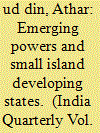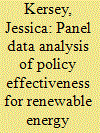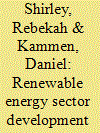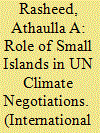| Srl | Item |
| 1 |
ID:
149841


|
|
|
|
|
| Summary/Abstract |
For many Small Island Developing States (SIDS) the cost of producing electricity from imported fossil fuels is so high and the cost of renewable energy technology has fallen so significantly that transitioning towards renewable energy is likely to produce cost savings. A recent workshop at NYU School of Law, which brought together SIDS utility representatives with a leading renewable energy developer and other stakeholders, provided strong support for this prediction. Utilities are likely to own the majority of renewable energy assets in SIDS and will therefore be the initial custodians of any cost savings renewable energy provides. This raises a key policy question: to what extent should SIDS utilities pass on these savings to consumers by lowering electricity rates? We analyze this overlooked element of energy policy and highlight undesirable consequences that complete disbursement of the savings to consumers could cause.
|
|
|
|
|
|
|
|
|
|
|
|
|
|
|
|
| 2 |
ID:
190747


|
|
|
|
|
| Summary/Abstract |
Recent developments in climate change-related negotiations indicate that there are emerging conflicts of interest between Small Island Developing States (SIDS) and emerging powers like India and China. Emerging powers have to address their developmental concerns while pursuing aspirations related to leadership in global governance. To take a leadership role in global governance structures relating to climate change, emerging powers need to pursue their interests while accommodating the concerns of their potential followers, which include SIDS. Increased conflict of interests between emerging powers and other sets of vulnerable countries could lead to adverse implications for the North–South divide in international environmental relations, which in turn will impact their leadership aspirations. Using the example of leadership in international relations and the statements made by the SIDS at COP26, this article concludes that the existing situation presents a challenge as well as an opportunity for emerging powers like India to take a leadership role in a reformed new world order.
|
|
|
|
|
|
|
|
|
|
|
|
|
|
|
|
| 3 |
ID:
149844


|
|
|
|
|
| Summary/Abstract |
Small Island Developing States (SIDS) have established ambitious renewable energy targets. The promotion of renewable energy has been motivated by several factors: a desire to lessen dependence on fossil fuels, to attract development assistance in the energy sector, and to strengthen the position of SIDS in climate change negotiations. Here we explore the interplay between the role of aid and energy policy in the development of renewable energy resources in SIDS. We find that the importance of development assistance has implications for the sustainability of renewable energy development, given that funding is not always accompanied by necessary energy policy reforms. We also identify energy efficiency and access to modern energy services as having received insufficient attention in the establishment and structure of renewable energy targets in SIDS, and argue that this is problematic due to the strong economic case for such investments.
|
|
|
|
|
|
|
|
|
|
|
|
|
|
|
|
| 4 |
ID:
180129


|
|
|
|
|
| Summary/Abstract |
Accelerating the rate of renewable energy deployment in Small Island Developing States is critical to reduce dependence on expensive fossil fuel imports and meet emissions reductions goals. Though many islands have now introduced policy measures to encourage RE development, the existing literature focuses on qualitative recommendations and has not sought to quantitatively evaluate and compare the impacts of policy interventions in the Caribbean. After compiling the first systematic database of RE policies implemented in 31 Caribbean islands from 2000 to 2018, we conduct an econometric analysis of the effectiveness of the following five policy interventions in promoting the deployment of RE: investment incentives, tax incentives, feed-in tariffs, net-metering and net-billing programs, and regulatory restructuring to allow market entry by independent power producers. Using a fixed effects model to control for unit heterogeneities between islands, we find evidence that net-metering/net-billing programs are strongly and positively correlated with increases in installed capacity of renewable energy - particularly solar PV. These findings suggest that the RE transition in the Caribbean can be advanced through policies targeting the adoption of small-scale, distributed photovoltaics.
|
|
|
|
|
|
|
|
|
|
|
|
|
|
|
|
| 5 |
ID:
128420


|
|
|
|
|
| Publication |
2014.
|
| Summary/Abstract |
Attempts to reform the electricity sector in developing countries have achieved mixed results, despite the implementation of similar reforms in many developed countries, and concerted effort by donors to transfer reform models. In many cases, political obstacles have prevented full and effective implementation of donor-promoted reforms. This paper examines the political economy of power sector reform in Fiji from 1996 to 2013. Reform has been pursued with political motives in a context of clientelism. Policy inconsistency and reversal is explained by the political instability of ethnic-based politics in Fiji. Modest success has been achieved in recent years despite these challenges, with Fiji now considered a model of power sector reform for other Small Islands Developing States (SIDS) in the Pacific. The experience demonstrates that reform is possible within difficult political environments, but it is challenging, takes time and is not guaranteed. The way in which political motives have driven and shaped reform efforts also highlights the need for studies of power sector reform to direct greater attention toward political drivers behind reform.
|
|
|
|
|
|
|
|
|
|
|
|
|
|
|
|
| 6 |
ID:
121360


|
|
|
|
|
| Publication |
2013.
|
| Summary/Abstract |
Island regions and isolated communities represent an understudied area of not only clean energy development but also of innovation. Caribbean states have for some time shown interest in developing a regional sustainable energy policy and in implementing measures which could help to protect its member states from volatile oil markets while promoting reliance on local resources. Here we examine four case studies of renewable energy advancements being made by public utility companies and independent energy companies in the Caribbean. We attempt to locate renewable energy advances in a broader historical framework of energy sector development, indicating a few policy lessons. We find that different degrees of regulatory and legislative sophistication have evolved in different islands. Islands should have specialized policy focus, contrasting the ad-hoc nature of current regional energy policy discussion. We also conduct a cost benefit analysis which shows that these early, innovative alternative energy projects show themselves to be both profitable and significant sources of emissions reduction and job creation. This lends support to the potential benefits of regional energy policy.
|
|
|
|
|
|
|
|
|
|
|
|
|
|
|
|
| 7 |
ID:
167055


|
|
|
|
|
| Summary/Abstract |
This article is about small island developing states (SIDS) and their role in the United Nations (UN) climate negotiations. It presents a discussion about how a constructivist model of foreign policy analysis and international system design can be used to explain the impact of climate ideas of SIDS on UN climate system. The SIDS have been in the UN climate negotiations since the 1980s, committed to a climate agenda with clear ideas about the challenges they face and the type of solutions they seek from the international policy community. In this respect, this article seeks to explain that climate ideas shared among SIDS have established an intersubjective understanding to promote a compelling common voice at international climate negotiations, which is based on an island vulnerability identity. These ideas have shaped the policy thinking and interests of climate negotiators to design institutional frameworks that have given special consideration to SIDS. It concludes that this observation represents a disproportionate impact of SIDS. Despite the weak material powers for being small islands, their climate agenda has influenced the UN system design to address their concerns.
|
|
|
|
|
|
|
|
|
|
|
|
|
|
|
|